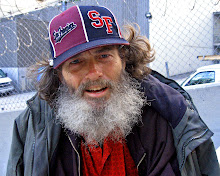by
Bishop Kenneth E. Untener
Never in my life had I talked about and listened to so much about the poor. On some days I had four or five meetings, and each began with "the poor".
I learned a lot, not only about the poor, but also about us, and how we think about (or don't think about) the poor. Believe me, I am no expert on the poor. But I learned eight things in particular during those 97 days.
1) We tend to forget the "poor" poor.
A typical scenario goes like this . . . The chairperson begins the meeting by saying something like, "Well, the bishop has asked that we begin each meeting with a discussion about how this affects or involves the poor. So we're going to spend a few minutes doing that. I'll throw it open for anyone who would like to say something."
Silence.
Then someone says, "Well, people can be poor in a lot of different ways. There are some people, for example, who don't have friends, and they are poor."
I interrupt. "I agree with you. But this decree has to do with the 'poor' poor. They are the ones who get left out, because they're usually not part of what we did yesterday or today. The 'poor' poor are the ones who rarely if ever are first on an agenda. So let's talk about them."
Mental note: Always start with the "poor" poor.
2) The poor are often "invisible."
The poor around us (as opposed to the ghetto, or some distant country) are often invisible. They aren't in our same "networks."
They aren't at the same gatherings.
They don't belong to councils or committees.
They don't always go to church (and if they do, they try hard not to look poor).
They don't bump into us at the mall or the supermarket.
Take tuition assistance at schools. We offer help for those who cannot pay full tuition—or cannot pay any tuition. But the poor often do not come forward. Why? It is announced in the parish bulletin. But the poor don't get the parish bulletin. [They are out of touch because they are so very poor.]
Mental note: It takes initiative and creativity to reach the poor.
3) The biggest problem is the "undeserving poor."
Place a child before us with a hungry face and ragged clothes and we jump at the chance to help. Poor children don’t make it hard to help the poor. Poor adults who have had bad luck don’t make it hard to help the poor.
The “undeserving poor” are the ones who make it hard to help the poor. They are the ones who seem to take advantage of the system, or other people. [But] help them anyway. If you start to distinguish between the deserving and the undeserving poor, you are finished—at least as far as the gospel is concerned. Who is really to decide if they are undeserving?
Mental note: If you're going to err, err on the side of generosity.
4) If you try to help the poor, you will sometimes get taken.
Every parish minister can tell stories of people who have come with a sad tale. You check it out very carefully, give them money—and later find out that they did the same thing at three or four neighboring parishes. Helping the poor has its risks. You will sometimes get taken.
Mental note: Learn to write off your losses.
5) Helping the poor is not always a pleasant experience.
It's no picnic helping the poor. There is often no feeling of fulfillment. It's work—like a lot of virtue is work—like taking care of an elderly parent is work.
The "poor" poor are not always so noble, and they are the hardest to deal with—which is probably why we don't.
Mental note: When you help the poor, you always receive more than you give—but it may not seem that way at the time.
6) Food baskets at Thanksgiving, toys at Christmas are good as far as they go—but they don't go very far.
People easily talk about direct help to the poor on special occasions—clothes, food, money. Those fine things shouldn't be taken lightly. But that is the easy part. The hard part is trying to do something about the poor's state in life.
The discussion always slowed when we tried to focus on this. Where do you begin? What do you do?
It's hard when you deal with the causes. How can we give them basic skills to manage their lives? What about health insurance? How do we help them find work? How do we help them find work that pays a living wage? Why are single parents, usually women, abandoned so easily by a spouse?
Mental note: Direct assistance is good. Tackling the causes is better.
7) Sometimes the poor are overwhelmed into inaction.
People who deal with the poor can tell a hundred stories about how they waste money and opportunities. You bring food to their home—and notice a large-screen TV. Whenever you visit, they are watching TV.
Why? Let’s try to put ourselves in their shoes.
It is a hopeless mess, [a big cluttered garage that you have wanted to clean for months or even years!] but today is the day you are going to tackle it. Getting started is the problem, because with a mess like that, there is no logical place to begin. [Like you] the poor can't get enough together even to get started—a down payment, transportation, protection from an abusive husband, an education.
Their life is like that all the time. It is too big a mess even to know where to begin. So they try to forget it by enjoying some "luxuries," having a beer, watching TV, etc.
Mental note: Don't judge their "laziness" too quickly.
8) The poor also help the poor.
People who work with the poor can tell a hundred stories about the “generous poor.” A family takes in a neighbor’s child without a second thought, because the child needs to be taken in somewhere. A person who has next to nothing gives money to someone who has nothing at all, simply saying, “Well, they need it more than I do.” A poor family in a small house takes in another family because they had their heat turned off in the dead of winter. Food is shared even though there isn’t enough to begin with.
Mental note: God loves a cheerful giver, which is one of the reasons why God loves the poor.
______________
What will you do with your Homeless in America?
VOTE – Scroll down & vote in the polls.
COMMENT – Daily insights, prayers, thanksgiving & praise.
SUBSCRIBE! –Top right column.
LIST – Yourself as a blog “Follower” middle right column.
INVITE – Friends and family to Subscribe!
http://www.homelessinamerica.blogspot.com/
VOTE – Scroll down & vote in the polls.
COMMENT – Daily insights, prayers, thanksgiving & praise.
SUBSCRIBE! –Top right column.
LIST – Yourself as a blog “Follower” middle right column.
INVITE – Friends and family to Subscribe!
http://www.homelessinamerica.blogspot.com/


























No comments:
Post a Comment